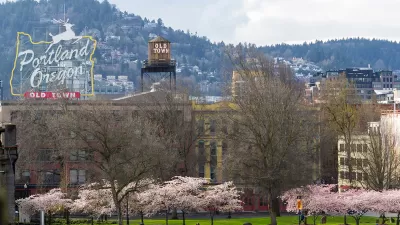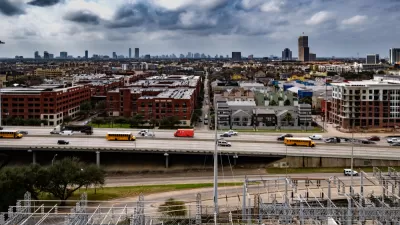Call it "Tax Breaklandia," according to this Bloomberg article.

Noah Buhayar and Lauren Leatherby begin this story with an anecdote about a forthcoming $206 million tower in downtown Portland that will feature "ground-floor retail, six floors of offices, and more than 200 luxury apartments."
"Amenities will include a yoga studio and roof deck. But the centerpiece will be a swimming pool that cantilevers out of the eighth floor." The developer says the building will offer "the finest for-rent product in the city."
"It’s also eligible for a U.S. tax break meant to help the poor," write Buhayar and Letherby, referring to the federal Opportunity Zone program.
The question of whether the Opportunity Zone program enacted by the 2017 GOT tax reform bill is actually a benefit to low-income and vulnerable communities is already open for discussion. Most recently, the neighborhood surrounding the Mall of America site in Minnesota came under scrutiny for its inclusion in the program. Before that it was the planned site of Amazon's new headquarters in New York. But Portland's designations raises the stakes a notch.
"Oregon did an audacious thing," write Buhayar and Letherby: "It selected the entire downtown of its largest city to be eligible for the law’s suite of benefits, as well as neighborhoods such as the Pearl District, where new high-rises loom over old industrial spaces converted into 'creative' offices and boutique furniture stores sit near juice bars serving açai bowls. The Central Eastside, an area that Portland’s alt weekly crowned the city’s 'best food neighborhood,' is also included."
According to analysis by Real Capital. Analytics, Portland's use of the Opportunity Zone program to spur investment in an already-high-demand part of the city is an outlier compared to the rest of the nation.
FULL STORY: Welcome to Tax Breaklandia

Planetizen Federal Action Tracker
A weekly monitor of how Trump’s orders and actions are impacting planners and planning in America.

Map: Where Senate Republicans Want to Sell Your Public Lands
For public land advocates, the Senate Republicans’ proposal to sell millions of acres of public land in the West is “the biggest fight of their careers.”

Restaurant Patios Were a Pandemic Win — Why Were They so Hard to Keep?
Social distancing requirements and changes in travel patterns prompted cities to pilot new uses for street and sidewalk space. Then it got complicated.

Platform Pilsner: Vancouver Transit Agency Releases... a Beer?
TransLink will receive a portion of every sale of the four-pack.

Toronto Weighs Cheaper Transit, Parking Hikes for Major Events
Special event rates would take effect during large festivals, sports games and concerts to ‘discourage driving, manage congestion and free up space for transit.”

Berlin to Consider Car-Free Zone Larger Than Manhattan
The area bound by the 22-mile Ringbahn would still allow 12 uses of a private automobile per year per person, and several other exemptions.
Urban Design for Planners 1: Software Tools
This six-course series explores essential urban design concepts using open source software and equips planners with the tools they need to participate fully in the urban design process.
Planning for Universal Design
Learn the tools for implementing Universal Design in planning regulations.
Heyer Gruel & Associates PA
JM Goldson LLC
Custer County Colorado
City of Camden Redevelopment Agency
City of Astoria
Transportation Research & Education Center (TREC) at Portland State University
Camden Redevelopment Agency
City of Claremont
Municipality of Princeton (NJ)





























